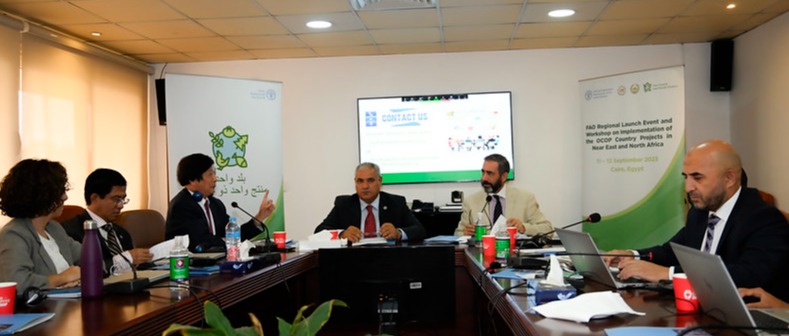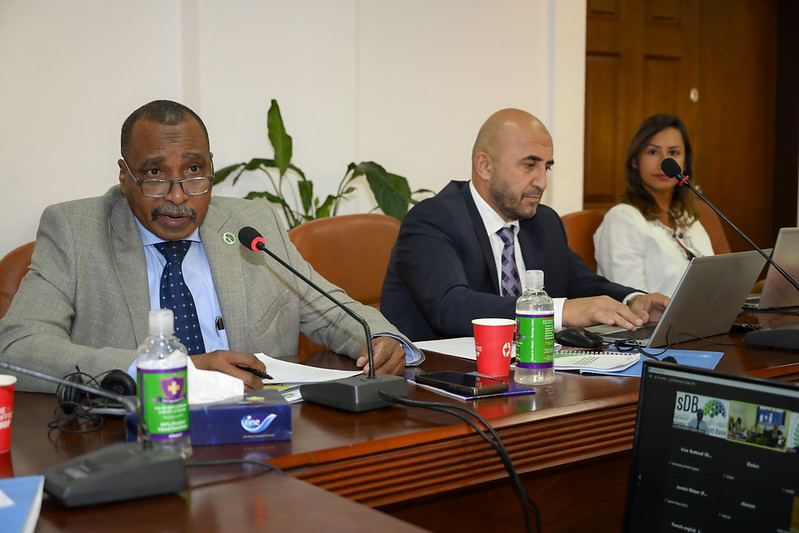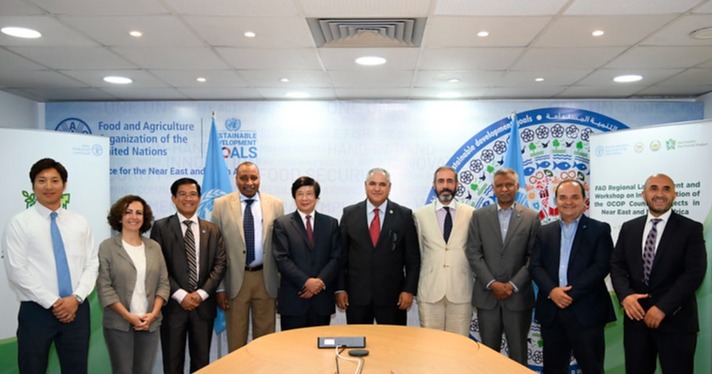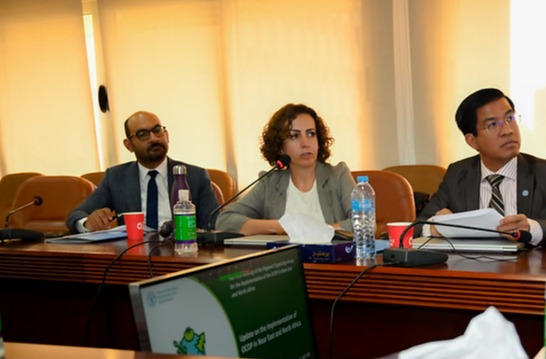News
The first meeting of the Regional Organizing Group for Near East and North Africa sets the course for sustainable development of the Special Agricultural Products across the region

The first meeting of the FAO Regional Organizing Group for the OCOP in the Near East and North Africa region.
©FAO/Ahmed Elsheemy
14/09/2023 Cairo, Egypt – The inaugural meeting of the FAO Regional Organizing Group (ROG) for the One Country One Priority Product (OCOP) initiative in the Near East and North Africa (NENA) has set a promising path for the sustainable development of the Special Agricultural Products (SAPs) in the region. This high-level meeting was attended by 40 members of the ROG, both in person and virtually, and was chaired by Mr Serge Nakouzi, FAO Deputy Regional Representative in NENA. The meeting emphasized the critical role of regional coordination in realizing the objectives of the OCOP and its potential to transform agrifood systems in the region.
The OCOP ROG in the NENA region will play a crucial role in effectively organizing and managing this important initiative at the regional and national levels. Regionally, the ROG will coordinate, support, and oversee planning, implementation, monitoring, and reporting on the activities while aligning them with regional priorities, FAO Strategic Frameworks for 2022-31, and the Sustainable Development Goals. The ROG will foster collaboration among the OCOP Secretariat, the National Task Forces, and the potential project countries in the region, offering technical guidance, strengthening partnerships, facilitating market access to SAPs, and establishing an efficient mechanism for seamless coordination and reporting, ensuring the successful implementation of the OCOP initiative.
The ROG is led by a diverse group of stakeholders. It is chaired by Mr Abdul Hakim Elwaer, FAO Assistant Director-General and Regional Representative in NENA, and the Co-Chair and Vice-Chairs represent the key regional organizations, such as the Arab Organization for Agricultural Development (AOAD), Arab Fund for Economic and Social Development (AFESD), Islamic Development Bank (IsDB), and Association of Agricultural Research Institutions in the Near East & North Africa (AARINENA), as well as a Secretariat comprised of FAO Officers. Additional members encompass the representatives of the institutions, such as the Arab Authority for Agricultural Investment and Development (AAAID), International Center for Biosaline Agriculture (ICBA), Arab Federation for Food industries (AFFI), European Bank for Reconstruction and Development (EBRD) and the FAO Regional and Country Offices in NENA.
Key outcomes of the meeting
The meeting commenced with welcome remarks from Mr Elwaer, who stressed the vital role of regional coordination and indicated that the OCOP is designed as a country-owned and country-led initiative. The ROG, as a coordination body, will provide technical and facilitation support for the efficient and effective implementation of the initiative. Ms Beth Bechdol, FAO Deputy Director-General, gave the opening remarks and underscored the critical role of robust regional coordination in the OCOP's success. She emphasized that this group will have an important coordination role in supporting small-scale farmers and liaising with all stakeholders who are actively engaged with these crops and value chains.
After deliberations by members with parallel interpretations in English, French, and Arabic, the Terms of Reference and the composition of the ROG were endorsed.
Mr Jingyuan Xia, Executive Secretary of the OCOP Secretariat, FAO, provided updates on the progress of the implementation of OCOP globally. Ms Maryam Rezaei, FAO Agro-Industry Officer and the OCOP Regional Focal Point reported on the regional progress and activities, and Mr Philippe Ankers, FAO Sub-regional Coordinator for North Africa, briefed on the implementation of the initiative in the sub-region. Mr Nasredin HagElamin, FAO Representative in Egypt, shared promising insights into the implementation progress of OCOP in Egypt.
 |
Mr Jingyuan Xia, OCOP Executive Secretary, updated on global implementation of the OCOP. ©FAO/Ahmed Elsheemy |
Further on, Ms Maryam Rezaei presented the composition of the Regional Working Team, which is led by Mr Ahmad Mukhtar, Senior Economist FAO, and co-led by Ms Maryam Rezaei and Mr Hiroaki Sonoda, FAO Associate Professional Officer and OCOP Alternate Regional Focal Point. The members of the RWT are the FAO OCOP National Focal Points in the potential project countries such as Algeria, Egypt, Iraq, Jordan, Lebanon, Morocco, Saudi Arabia, Syria, Tunisia, and Yemen.
|
Ms Maryam Rezaei, Agro-Industry Officer and OCOP Regional Focal Point presenting updates on the regional OCOP implementation. ©FAO/Ahmed Elsheemy |
Mr Yurdi Yasmi, FAO Deputy Regional Representative for Africa, presented the OCOP progress in Sub-Saharan Africa and the establishment of the ROG at its first meeting on 8 March 2023. With 28 OCOP potential project countries and 18 SAPs, spanning field and horticulture crops, forestry, and livestock products, there is much to explore and collaborate with the NENA region. He also highlighted Malawi, which is one of the five OCOP demonstration countries, with their focus on the banana value chain and mobilizing USD4 million from various sources. He also emphasized the importance of catalytic funding as the projects funded by the FAO Technical Support Programme (TCP) to start the field activities, engaging the governments to have ownership and leadership, and joining efforts for resource mobilization. It is also important to strengthen the partnership with academic and research institutions, the private sector, industries, and youth organizations. These all will lay the basis for scaling up the implementation of OCOP in the farmers’ fields.
The meeting also included statements by distinguished regional stakeholders, including Mr Ibrahim Adam Ahmed El-Dukheri, Director General of AOAD, as well as representatives of regional and international financial institutions, such as IsDB, EBRD and AAAID. In addition, representatives from the regional private sector and research institutions, including AFFI and ICBA, shared their perspectives on the future of sustainable agriculture in the region.
 |
Mr Ibrahim Adam Ahmed El-Dukheri, Director General of AOAD, sharing his thoughts at the meeting. ©FAO/Ahmed Elsheemy |
 |
Group photo of the ROG meeting participants. ©FAO/Ahmed Elsheemy |
The OCOP approach for agrifood system transformation
The OCOP initiative is closely linked with the FAO Strategic Framework for 2022-31 and aims to promote inclusive, profitable, and environmentally sustainable agrifood systems by focusing on the sustainable development of the value chains of SAPs. It focuses on five main areas: increasing productivity and promoting healthy diets; reducing food loss and waste while protecting biodiversity; optimizing water and land utilization; minimizing chemical use in agriculture; and addressing climate change. By taking concrete actions in these areas, the OCOP aims to develop sustainable value chains for SAPs, leading to the broader transformation of agrifood systems and benefiting FAO member states by enhancing food security, supporting farmers, boosting economic growth, and preserving the environment and biodiversity.
The OCOP ROG inaugural meeting sets the stage for a promising journey towards sustainable agriculture in the NENA region, with diverse stakeholders who are united in their commitment to this transformative initiative.

